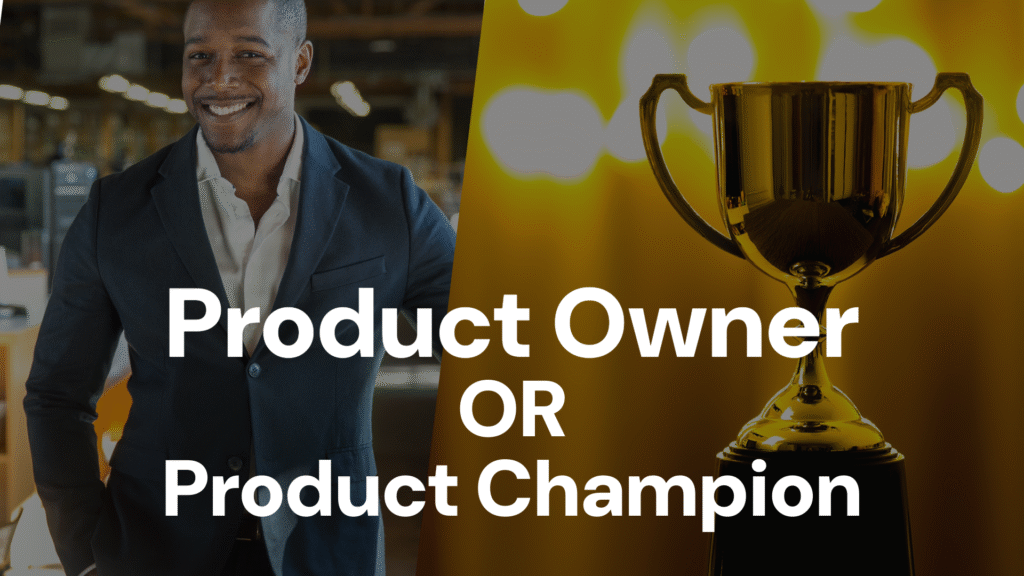
Let’s Be Champions, Not ‘Maliks’ (OWNERS)
Tell me something. We all see things that are just not quite right, don’t we? People will jump the queue, drive on the wrong side of the road to save two minutes, or the express counter at the supermarket will have someone with a full trolley. And yes, for all the grammar enthusiasts, that sign should say “fewer” items, not less!
We usually just shake our heads and get on with it. In the world of Agile and Scrum, the title “Product Owner” has become one of those things. We just accept it.
But should we?
For a long time, the title “Product Owner” has bothered me. It’s just two words, but words matter. They influence how we think, define our roles, and shape the team’s culture. The term “Product Owner” feels off because it implies one person has full ownership—like they’re the sole ‘boss’—which goes against the idea of a strong, collaborative team working together.
A Far Better Approach: The Product Champion
The main issue with the title “Product Owner” is straightforward: if one person is called the “Owner,” then what does that make everyone else on the team? Tenants? Just hired hands? It unintentionally creates a divide.
Great products aren’t built by one person giving orders. They come from a group of people working together, sharing ideas, and solving problems as a team. Think of it like a music performance—a jugalbandi—where different instruments come together to create something beautiful. (For the western world, think of it as an orchestra where hundreds of musicians play music together to create a symphony!)
A product is no different. It needs engineers, designers, testers, marketers, and others to feel equally responsible and connected. They should all feel, _”Haan, yeh mera product hai”_ (Yes, this is my product).
The problem with calling one person the “Owner” is that it can create a subtle hierarchy. It can make others feel like they need permission for everything, as if only the “Owner” has the final say. This kind of _‘maalik-pana’_ (owner-like attitude) can stifle creativity. Imagine being on a team where you’re afraid to take initiative because you think, _”What if the Owner doesn’t agree?”_ That hesitation can slow things down and kill good ideas.
Here’s an example: Think of a cricket team. If the captain called themselves the “Owner” of the team, it would sound ridiculous, right? Every player—whether it’s the bowler, batsman, or fielder—needs to feel responsible for the match. The captain’s role is to guide and support the team, not to “own” it.
Similarly, in a product team, the person leading should focus on empowering everyone to contribute, not act like they “own” the product. Expecting the whole team to feel ownership while giving just one person the title is like expecting Mumbai traffic to magically follow the rules just because the signal is red. It’s a nice idea, but it’s not realistic.
If we want truly collaborative teams, we need to rethink titles like “Product Owner.” A better name—like “Product Champion”—might help everyone feel equally responsible, valued, and empowered to build something amazing together.
It's Not Just About Words, It's About the Feeling!
So, you might ask, “Are we just playing with English words here? Does changing a title really make a difference?”
Honestly, it makes all the difference. Think about it like a cricket team.
An IPL team has an owner (maalik). He buys the team, he has the final say on big money matters. But on the field, during the match, who does the team look up to? The captain.
The captain is the team’s champion. He doesn’t own the team, but he leads it with passion. He is the one fighting with them, setting the strategy, and taking responsibility. He makes every player, from the star batsman to the newest bowler, feel like they are all in it together to win.
Our work in office is the same. When we use a word like “Owner,” it sounds like a top boss, separate from the team. But when we say “Champion,” it feels like a captain who is playing right alongside us.
At the end of the day, you want your team to have that josh. You want every person to feel, “Arre, yeh toh apna kaam hai!” (Hey, this is our own work!). This simple change from “Owner” to “Champion” does exactly that.
It sends a simple, powerful message to every person on the team: “This is your project too. Your ideas are important. We are all in this together!”
Of course, I know many of you intellects, Agile gurus, and learned pundits out there might not agree with my thoughts on this. You may have strong reasons to stand by the classic “Product Owner” title.
And that’s perfectly okay! That’s the beauty of it. We live in a free world with free speech, where we can all share our ideas, debate them, and agree to disagree.
Disclaimer: This blog is a personal weblog. The opinions expressed here represent my own and not those of my current employer or past employers.
Anand is a human being and can make mistakes, so double-check it 😉

